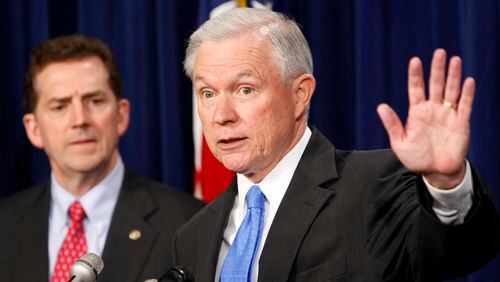President-elect Donald Trump tapped Alabama U.S. Sen. Jeff Sessions as his attorney general Friday, putting a close ally with a controversial record on civil rights in charge of enforcing federal anti-discrimination laws.
Trump lauded the four-term senator and former Alabama attorney general as a “world-class legal mind,” but Democrats and civil rights groups said the nominee should get close scrutiny from senators because of his record.
At the core of critics’ concerns are past statements from Sessions they viewed as racially insensitive, as well as his stances on voting rights, immigration and the criminal justice system.
“Based on the disdain for our nation’s civil rights laws that Senator Sessions has consistently demonstrated throughout his career, his fitness to be the chief protector and enforcer of them falls into dire question,” NAACP President Cornell William Brooks said.
Republicans praised the appointment.
“A principled and good man, he will restore honor to a department that, under President Obama, perpetually pushed a political agenda while neglecting to enforce the law,” said U.S. Sen. John Cornyn of Texas, the chamber’s No. 2 Republican.
Sessions was part of the first batch of Cabinet and defense-related nominees rolled out by Trump’s transition team, picks that were viewed as a collective reorientation to the right on national security issues. Trump also named retired Lt. Gen. Michael Flynn as his national security adviser and Kansas U.S. Rep. Mike Pompeo as his CIA director.
Prior Senate nomination
The left’s hand-wringing on Sessions is not new.
Accusations of racism have dogged the 69-year-old for much of his career, a characterization the lawmaker has always fought.
As a young lawyer tapped by President Ronald Reagan for a federal judgeship in 1986, his nomination was blocked by members of the Republican-led Senate Judiciary Committee who were concerned about past statements deemed racially charged.
In testimony before the committee, former colleagues recounted that as a U.S. attorney in Mobile, Ala., Sessions had labeled the NAACP, the American Civil Liberties Union and other civil rights groups as “un-American” and “Communist-inspired.”
Sessions was also accused of calling the Voting Rights Act, a landmark 1965 law designed to prevent racial discrimination at the ballot box, “intrusive legislation.”
An African-American federal prosecutor testified that Sessions had called him “boy” and said the Ku Klux Klan was fine “until I found out they smoked pot,” according to The New York Times, a remark Sessions later said was a joke.
Civil rights advocates warned Friday of what Sessions’ past remarks could mean moving forward on issues such as immigration.
“Immigrant and Latino communities have long looked to the Department of Justice for the protection of our civil rights, yet the agency would become the dispenser of terror and racial intolerance should Jeff Sessions be confirmed,” said Brent Wilkes, the national executive director of the League of United Latin American Citizens, a Hispanic rights organization.
Of particular concern to groups such as the NAACP is the enforcement of the Voting Rights Act three years after the Supreme Court struck key sections of the law.
The Rev. Raphael Warnock, pastor of Ebenezer Baptist Church in Atlanta, said Sessions’ nomination “will not help to heal our nation. It will further divide an already divided American electorate.”
Warnock, who leads the Rev. Martin Luther King Jr’s former church, said Sessions’ reputation proceeds him.
“We have a 30-year record,” Warnock said. “He has shown us who he and we ought to believe it.”
Senate tenure
A decade after being denied the judgeship, Sessions made his way to the U.S. Senate and quickly became one of the chamber’s most conservative voices.
He made immigration his signature issue, adopting a hard-line stance that led him to oppose nearly every bill on the subject that has wound its way through the Senate over the past 20 years.
Sessions sharply opposed bipartisan legislation in 2013 that sought to forge a path to citizenship for immigrants in the U.S. illegally, an unwavering stance that won him the title of “amnesty’s worst enemy” a year later from the conservative National Review.
He argued that noncitizens do not have constitutional protections and combated visa programs for guest workers and high-skilled foreigners, according to The Washington Post.
Sessions has been willing to cross the aisle on selected issues. He worked with Democratic colleagues to help reduce the sentencing disparity between crack and powder cocaine, a gap that was widely seen as disproportionately hurting African-Americans.
But earlier this year he sharply opposed another criminal justice overhaul to reduce sentences for nonviolent drug offenders. In the past, he has rejected legalizing marijuana and raised the specter of voter fraud.
Sessions became a close adviser to Trump after becoming one of the first members of Congress to endorse the New Yorker.
Trump’s nod toward Sessions was widely viewed as a reward for the senator’s loyalty.
Should he be confirmed by the Senate, it would undoubtedly nudge the Justice Department to the right, particularly on immigration.
The attorney general is additionally tasked with enforcing antitrust and civil rights law, representing the government in legal matters and helping vet potential Supreme Court nominees. Sessions would also help determine whether to make good on Trump’s campaign pledge to appoint a special prosecutor to investigate Hillary Clinton’s email practices.
Confirmation path
Senate Republican leaders, who will be tasked with shepherding Sessions’ nomination through the chamber in the new year, touted Trump’s selection and suggested they wanted the confirmation process to move along quickly.
“Jeff is principled, forthright and hardworking. He cares deeply about his country and the department he will be nominated to lead,” said Senate Majority Leader Mitch McConnell, R-Ky.
Georgia GOP U.S. Sen. David Perdue called Sessions “a natural fit” for the position.
Senate Democrats, meanwhile, indicated they would not go easy on Sessions, citing his past comments on immigration and civil rights.
The lawmaker’s past willingness to entertain Trump’s ban on Muslim refugees entering the United States could also come back to haunt him during his confirmation hearings.
“The fact that he is a senator does not absolve him from answering tough questions in the confirmation process,” said Chuck Schumer of New York, the incoming Senate Democratic leader.
Others were less polite.
“If you have nostalgia for the days when blacks kept quiet, gays were in the closet, immigrants were invisible and women stayed in the kitchen, Senator Jefferson Beauregard Sessions is your man,” said U.S. Rep. Luis Gutiérrez, D-Ill., one of the House’s most vocal advocates for comprehensive immigration reform.
Despite the ruffled feathers, Sessions is likely to be confirmed by the body he’s been a member of for 20 years.
First, he’s a member of the Judiciary panel that will vet him.
The Senate is known to be relatively deferential to its own members in terms of vetting executive branch nominations. And a change Democrats made to Senate rules in 2013 means that only 50 votes will be needed to confirm Sessions’ Cabinet nomination There are 51 Republicans in the Senate right now.
U.S. Tom Price, R-Roswell, is being viewed as a leading contender for health secretary. If appointed, he too would have be confirmed by the Senate.
About the Author








